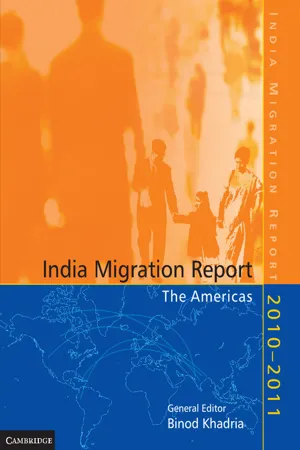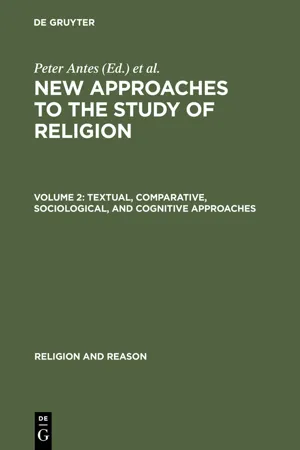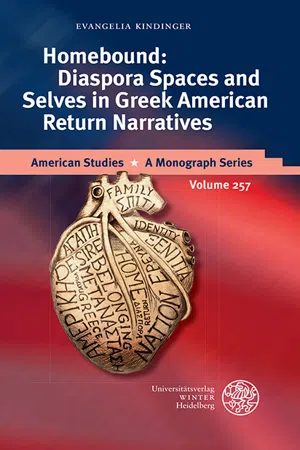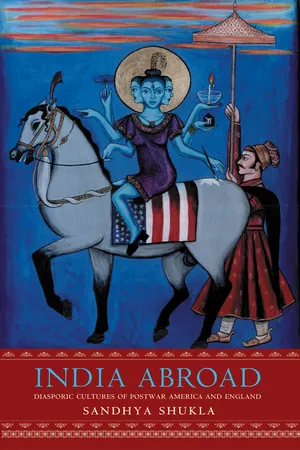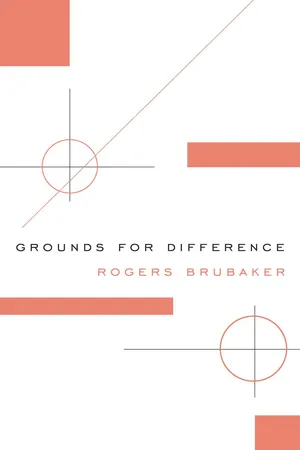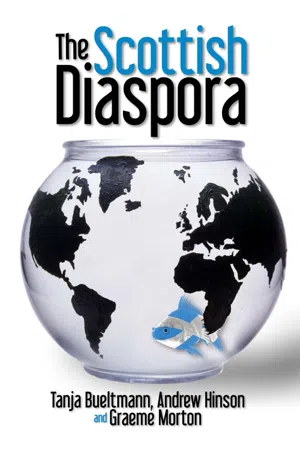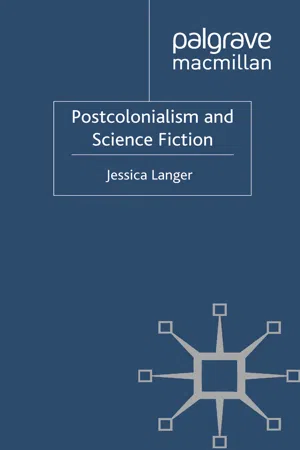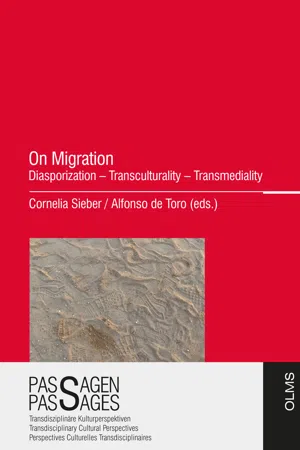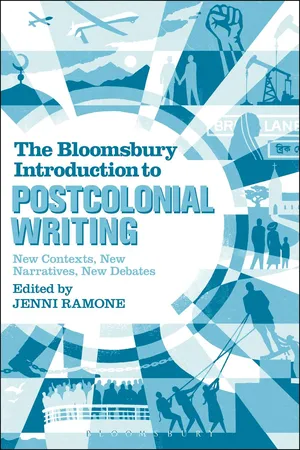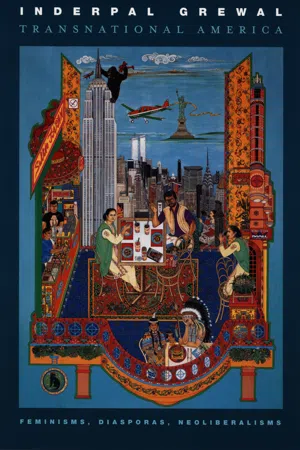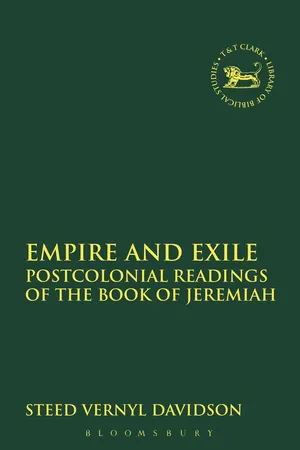Literature
American Diaspora
The American Diaspora refers to the dispersion of American people and culture beyond the borders of the United States. This concept is often explored in literature through narratives of migration, displacement, and the search for identity in new and diverse environments. It encompasses the experiences of various ethnic and cultural groups, reflecting the complexities of American society and its global impact.
Written by Perlego with AI-assistance
Related key terms
1 of 5
12 Key excerpts on "American Diaspora"
- eBook - PDF
India Migration Report 2010 - 2011
The Americas
- Binod Khadria(Author)
- 2012(Publication Date)
- Cambridge University Press(Publisher)
Chapter Other Diasporas in the Americas: A Comparative Perspective In the past 15 years, ‘diaspora’ has emerged as an often discussed term. Initially, the classical use of the term was mainly confined to the study of the Jewish experience. It was in the period from the late 1980s to the early 1990s that the term ‘diaspora’ became fashionable. Its connotations were no longer confined to the Jewish diaspora (Oonk 2007). Moreover, the academic world began wondering how the word ‘diaspora’ could be useful in understanding international migration, the migrants and their relation with the motherland and the host society. As Tololian (1991: 4–5) notably argues, ‘the term that once described Jewish, Greek, and Armenian dispersion now shares meanings with a larger semantic domain that includes words like immigrant, expatriate, refugee, guest worker, exile community, overseas community, ethnic community’. In the postmodern world, it is further argued that diasporic identities have been constructed and deconstructed in a flexible and situational way. While the increased complexity and deterritorialization of identities are valid phenomena constitutive of a small minority of diasporas, ideas of home and often the stronger inflection of homeland remain powerful discourses (Cohen 2010). Throughout human history, people have migrated from one place to another across the globe. Since the creation of nation-states, immigration has been a vital issue for many governments throughout the world to address. The purpose of this chapter is to explore a certain type of immigration, known as ‘diaspora formation,’ specifically with respect to the Americas. Although, historically, the word ‘diaspora’ has referred almost exclusively to the forced Jewish population dispersion throughout the world and their eventual return to their homeland in modern times, the word ‘diaspora’ has acquired a more flexible meaning. - Peter Antes, Armin W. Geertz, Randi R. Warne, Peter Antes, Armin W. Geertz, Randi R. Warne(Authors)
- 2008(Publication Date)
- De Gruyter(Publisher)
Religion and Diaspora by STEVEN VERTOVEC Over the last ten years there has been a proliferation of literature and a mush-rooming of interest, among members of ethnic minority groups as well as among academics, surrounding the notion of diaspora. Historians and social scientists describe myriad facets of diaspora, while an ever increasing number of self-conscious communities call themselves diasporas. Where once were dispersions, Kachig Tölölyan (1996: 3) observes, there now is diaspora. Indeed, as James Clifford (1994: 306) writes, [f]or better or worse, diaspora dis-course is being widely appropriated. It is loose in the world, for reasons having to do with decolonization, increased immigration, global communication and transport—a whole range of phenomena that encourage multi-locale attach-ments, dwelling, and traveling within and across nations. Or, in other words, diaspora has become one of the buzzwords of the postmodern age (Cohen 1999: 3). Surprisingly, religion has been the focus of relatively little attention within this growing field. The following article surveys a range of recent literature in order: (a) to outline some of the understandings of diaspora that have devel-oped over the past ten years or so, (b) to argue that current diaspora concepts often suffer from conflation with migration, minority and transnational-ism, and that each of these areas of study involve distinct—albeit related— dynamics of religious transformation, and (c) to indicate some patterns of reli-gious change in connection with each of these concepts. Emergent Meanings of Diaspora Most recent works on the concept diaspora naturally commence with a few statements on etymology (for example, Tölölyan 1996; Cohen 1997; Baumann 2000). The word diaspora derives from the Greek diaspeirein to distribute; it is a compound of s peirein to sow, to scatter like seed, and dia-from one end to the other.- eBook - PDF
Stranger at the Door
Writers and the Act of Writing
- Kristjana Gunnars(Author)
- 2006(Publication Date)
- Wilfrid Laurier University Press(Publisher)
Webster’s Dictionary defines diaspora in those terms, and its Greek etymology has to do with scattering and sowing. It is a word rich with implication, and is now used for any scattered nation that lives outside its original homeland, whether it is a racially or ideologically or religiously deter-mined nation. But it serves us well to focus back on the original use of the term when exploring what it means to be a diasporic writer today: that is, a writer living away from her homeland and perhaps writing in a foreign language, but for whom the original tribe or place or home con- tains the site of her imagination. She writes about a place in which she is not living and in a language not spoken there. The contention here will be, as Canadian expatriate writer Nancy Huston remarks in an interview in the Globe and Mail, “Expatriates learn a lot about the human condition that most people aren’t aware of. The specificity of childhood, for example.” 3 The dilemmas and conflicts and contradictions imposed on the diasporic writer were elucidated at length early on by Jewish writers in Europe. Hannah Arendt highlights the situation of the diasporic writer in her discussion of Franz Kafka and Walter Benjamin, in her introduction to Benjamin’s collection of essays titled Illuminations. Arendt quotes from a letter Kafka wrote to Max Brod about German-Jewish writers. As a Jew in Prague during the early part of the century, Franz Kafka is said to have somehow prophesied the Holocaust by some of the images that appeared in his fiction, such as “The Hunger Artist,” long before these things ever happened. The subject of his letter to his friend Brod is the so-called “Jewish question.” Here is Arendt’s summary of Kafka’s exposition: In a letter to Max Brod about German-Jewish writers he [Kafka] said that the Jewish question or “the despair over it was their inspiration— an inspiration as respectable as any other but fraught, upon closer examination, with distressing peculiarities. - No longer available |Learn more
- Evangelia Kindinger(Author)
- 2015(Publication Date)
- Universitätsverlag Winter(Publisher)
26 I utilize diaspora as a concept descriptive of what 25 Clifford intentionally uses the plural of diaspora in order to exemplify the versatility of the concept. 26 I discuss specific representations of the Greek diaspora and not the historical implications of the term within a Greek context. For more historical informa-tion on the Greek diaspora, specifically the Greek-American Diaspora, see Diaspora and the Homeland 43 Pnina Werbner calls “hybrid and heterogeneous” (5) communities, and as a “concept of sameness-in-dispersal” (Ang qtd. in Stewart 63) that is only useful when specified and contextualized. Diaspora is not only de-scriptive of heterogeneous communities, the concept itself is heteroge-neous and oftentimes contradicting, especially with regard to how it discusses ‘nation’ and ‘homeland.’ A key to understanding how this concept works is to consider the triad of diaspora, nation, and home – geographical, cultural and social narratives that can only be discussed with reference to one another. As Patricia Wald argues in “Minefields and Meeting Grounds: Transnational Analyses and American Studies” (1998): “Diaspora names a fundamental (and frequently nostalgic, even when ambivalent) investment in a homeland, a place to which one belongs” (209). Cotsakis’s protagonist John is certainly very invested in his former homeland. From the very beginning, he always stresses that he does not want to stay in the United States, but return home as soon as he has ac-quired his “fortune” (9). He does not uphold this promise though, as life intervenes: he starts a family and his own business. This is symptomatic for fictional portrayals of the first generation as I pointed out in the in-troductory chapter: return is a dream deferred by socio-economic and personal circumstances. The investment Wald writes about remains though, even in the new place of settlement, at least according to Robin Cohen, who has dis-cussed this further in his description of diaspora. - eBook - PDF
India Abroad
Diasporic Cultures of Postwar America and England
- Sandhya Shukla(Author)
- 2021(Publication Date)
- Princeton University Press(Publisher)
THREE AFFILIATIONS AND ASCENDANCY OF DIASPORIC LITERATURE I N THE LAST several years in the United States and Britain, there has been an explosion of interest in the Indian diaspora and in things In-dian. While we may observe this trend in cinema, fashion, and music, Indianness is particularly apparent in the field of literature. Many Indian authors who have lived in Britain and the United States have become household names since at least the early 1980s. Novels by Indians, both immigrants in the first world and those in the subcontinent, have won a range of international literary prizes, not the least of which is the 2001 Nobel Prize for Literature to Indo-Trinidadian V. S. Naipaul. And recogni-tion of a different kind can be seen in the appearance of Indian Canadian Rohinton Mistry’s novel A Fine Balance in Oprah’s Book Club. 1 Certainly the growing visibility of Indian literary work has particular emphasis and energy in the individual contexts of the United States, Britain, Canada, or the Caribbean, but the simultaneity of the national developments, the gestures to elsewhere (India and other places) in the writings themselves, and the intertextuality among the authorship signals a diasporic type of production. In this chapter we turn to literatures that provide comparative narrative possibilities for diasporic Indianness. The readership, which receives, claims, and is claimed by literature, offers a number of complexities to the framing of this kind of cultural production. A lead editorial in a 2000 issue of India Currents , a magazine from San Jose, California, discussed the plethora of recent fiction by both Indians abroad and back home and explored in particular the disjuncture between different community mem-bers’ expectations of texts and what those texts can deliver. - eBook - PDF
- Rogers Brubaker(Author)
- 2015(Publication Date)
- Harvard University Press(Publisher)
The universalization of diaspora, paradoxically, means the disap-pearance of diaspora. James Clifford (1994: 305, 325–327) and others have argued persuasively that there is no reason to privilege the Jewish experience, not least because that experience is internally complex, ambivalent, and by no means straight-forwardly “diasporic” in the strict sense of the term. But there is no reason to speak of the diasporization of every more or less dispersed population. Even the editor of the journal Diaspora —a key vehicle for the prolifera-tion of academic diaspora-talk—noted in the journal’s sixth year that dias-pora “is in danger of becoming a promiscuously capacious category” and urged at least some “stringency of definition” (Tölölyan 1996: 8, 30). Besides the nomination of new candidates for diaspora status, the “dias-pora” diaspora also involves a dispersion in disciplinary and social space. Within the academy, the term is now used throughout the humanities and social sciences. A sampling of forty recent dissertations on diaspora showed that they were distributed among forty-five different fields and subfields, 122 The “Diaspora” Diaspora ranging from various subfields of history, literature, anthropology, and so-ciology through Black studies, women’s studies, religion, philosophy, com-munications, folklore, and education, to art history, cinema, dance, music, and theater. As Tölölyan (1996: 27) has observed, the “theory-driven revo-lution in the humanities” has been central to this disciplinary (and trans-disciplinary) dispersion. Dispersion has been even more striking outside the academy: in the me-dia, on the web, and in the self-representations of a wide range of groups and initiatives. - eBook - PDF
- Tanja Bueltmann, Andrew Hinson, Graeme Morton(Authors)
- 2013(Publication Date)
- Edinburgh University Press(Publisher)
The story of diaspora is of the people from one country moving to two or more different countries, conceiving attachment and longing to their homeland, and engaging in activities that can form ethnic boundaries in distinction to other ethnicities and nationalities. Fitting the discussion so far presented, William Safran’s schemata – based on the Jewish diaspora – defines the concept of diaspora as an ideal type: 1. They, or their ancestors, have been dispersed from a specific original ‘center’ to two or more peripheral, or foreign, regions. 2. They retain a collective memory, vision, or myth about their original homeland – its physical location, history, achievements, and, often enough, sufferings. 3. Their relationship with the dominant element of society in the hostland is complicated and often uneasy. They believe that they are not, and perhaps cannot be, fully accepted by their host society and therefore feel partly alienated and insulated from it. 4. They regard their ancestral homeland as their true, ideal home and as the place to which they or their descendants would (or should) eventually return – if and when conditions are appropriate. 5. They continue to relate, personally or vicariously, to that homeland in one way or another, and their ethno-communal consciousness and solidarity, which reach across political boundaries, are importantly defined in terms of the existence of such a relationship. That relationship may include a collective commitment to the maintenance or restoration of their original homeland and to its independence, safety, and prosperity. The absence of such a relationship makes it difficult to speak of transnationalism. 6. They wish to survive as a distinct community – in most instances as a minority – by maintaining and transmitting a cultural and/or religious heritage derived from their ancestral home and the symbols based on it. - eBook - PDF
- J. Langer(Author)
- 2011(Publication Date)
- Palgrave Macmillan(Publisher)
Diaspora and Locality 57 and analysis of the diasporic movements that have been inherent to colonization. Like postcolonialism itself, diaspora suffers from a materialist/ discursive divide. In general, diaspora is clearly both a physical, geographical and often economic displacement, while also a men- tal, emotional and spiritual one. Different historical contexts vary in their distribution of these and other elements, but most or all are present in every case. It does not make sense, for instance, to talk about movement of peoples across physical space without discussing the emotional effects of displacement’s discord, nor is it sensible to address the spiritual difficulties of the refugee without attention to his or her likely destitution. The extent to which theorization of diaspora engages with each side of this divide is varied, but much of the most effective critical exploration balances the two in some way. For Vijay Mishra, inherent in diaspora is some sense of loss, a con- stant dissonance, a permanent wound or scar that disfigures in some way the experience of a diasporic people. “All diasporas are imagi- nary”, he quips, riffing on the opening of Tolstoy’s Anna Karenina, “but every diaspora is unhappy in its own way” (1996: 189). The word “discordant”, as used by Braziel and Mannur, is therefore in this view particularly resonant: diaspora here refers to movements that are the result of conflict or discord at home or abroad – conflicts that are difficult and bring about trauma, requiring a coming to terms. In The Literature of the Indian Disapora: Theorizing the Diasporic Imag- inary (2007), Mishra specifies that the loss inherent in disapora is an “impossible mourning” (9). It is a longing for a pure, unhyphenated identity, a desire for concord between where one is from and where one is. The “diasporic imaginary”, a term coined by Mishra, refers to “any ethnic enclave in a nation-state that defines itself ... - eBook - PDF
On Migration
Diasporization – Transculturality – Transmediality
- Cornelia Sieber, Alfonso de Toro, Cornelia Sieber, Alfonso de Toro(Authors)
- 2021(Publication Date)
- Olms, Georg(Publisher)
With the growing emigration to the Americas, diasporic groups of these new linguistic nation-alities, together with newly formed “homelands” (for instance German y and Italy, new “national states” founded in 1870), supported these tendencies, which ultimately led to a century of ethnic cleansing and the creation of new (this time displaced) diasporic communities – most recently in Bosnia-Herzegovina and in Kosovo. As a result, contemporary diasporic communities that are analyzed, for instance, in Robin Cohen’s Oxford -based Transnational Communities Programme (cf. www.transcomm.ox.ac.uk) , are referred to almost exclusively as “national” groups. From 36 groups, only a few are “continental” – Africans divided in mahgreb/sub-sa-haran, Latin Americans (but with some national sub-groups), South Asians (although there are specialized projects on Pakistanis, Vietnamese, Indians, and even “sub -na-tional communities” as Sikhs, G ujaratis, etc.). 3. Inflation of diasporas: Globalization, Transnationalities, Migra-tions, hybrid identities. Diasporic Literature? – Exilio, Desexilio, Diáspora Nevertheless, the “inflation” of diasporas has less to do with nationalisms – although, as we have shown, it is still the first approach for research activity in this field – but much more with globalization, growing migration, mobility, and the forming of trans-national and hybrid identities. Again, I would like to analyze this development by pre-senting examples from my field of research, Latin American literature. In the 1970s and ‘80s, reader interest in Latin American literature grew in Europe (the so-called boom). Meanwhile, a growing number of states in the sub-continent were ruled by military dictators. Internal repression, along with an increasing prestige in the Western world, forced or prompted many writers to emigrate, leading most of the con-tinent ’s literature to be produced in exile. - Jenni Ramone(Author)
- 2017(Publication Date)
- Bloomsbury Academic(Publisher)
In Robin Cohen’s defining work on global diaspora he signals the marked entry of scholars of cultural studies and literature into the field of diaspora studies as ‘assailants’ and ‘space invaders’ in a field that was hitherto dominated by the social sciences. 1 Until recently, migration and diaspora were domains reserved for social scientists, who studied the movement and flow of people – first from the perspective of economics and sociology, then of political science, then anthropology and even ethics. With the dawn of a new century and a growing corpus of literary works about migration produced in all the major publishing centres of the world, scholars of literature and culture have recently carved a place for a different type of study of migration and diaspora, one focused around questions of poetics and cultural production as they intersect with the rights of exiles, migrants and the displaced more generally. This most recent expansion of the field favours interdisciplinary modes of scholarship that tackle the global dimensions of migration studies through the dialogue between work in literature and the humanities and the social sciences. This chapter examines migration and diaspora studies in light of new forms of literary reading and writing. The two fields are presented here as distinct but overlapping disciplines in order to tease out some of the 16 Contemporary Migration and Diaspora Studies: Current Debates and the Role of Literature Subha Xavier The Bloomsbury Introduction to Postcolonial Writing 256 concerns that have arisen within the scope of each. Discussions of concepts in migration and diaspora studies are further augmented, in the pages that follow, by references to salient literary criticism as it thematically or methodologically intersects with the social sciences.- eBook - PDF
Transnational America
Feminisms, Diasporas, Neoliberalisms
- Inderpal Grewal, Caren Kaplan, Robyn Wiegman, Caren Kaplan, Robyn Wiegman(Authors)
- 2005(Publication Date)
- Duke University Press Books(Publisher)
chapter one becoming american: the novel and the diaspora V Within the United States, the record number of those identifying them-selves as ‘‘foreign-born’’ (almost 31.2 million according to the last census) has created an extremely diverse group of migrants who confound attempts to theorize what it means to be a citizen. ∞ Questions of citizenship have became vexed as new social movements have produced heterogeneous, changing, and overlapping subjects. Yet it is not possible to argue that social movements or transnational formations have been able to prevent national-ism or the formation of national subjects. While some assume that na-tionalism is linked to a more settled subject and that mobile subjectivity could be resistant to nationalism, ≤ it is clear that nationalism itself has proved to be protean and mobile, providing identities and a≈liations to mobile as well as settled subjects, and indeed to what have come to be called ‘‘global’’ and ‘‘cosmopolitan’’ subjectivities as well as to specific and local ones. ≥ Thus while some may argue that the appearance of transnational movements, subjects, and connections has sapped the power of national-isms, ∂ it could also be claimed that the strength of various nationalisms is visible within the transnational arena, ∑ giving a sense of place to those who see themselves as displaced. As a consequence of these shifts, the binaries 36 Becoming American of placement and displacement, mobility and immobility could not ade-quately capture the ways in which ideas of place are crucial to those dis-placed, or in which immobility is central to creating mobile subjects. - eBook - PDF
Empire and Exile
Postcolonial Readings of the Book of Jeremiah
- Steed Vernyl Davidson(Author)
- 2012(Publication Date)
- T&T Clark(Publisher)
63 a. Theorizing Diaspora Theoretical engagement of the notion of diaspora starts with the Baby-lonian experience of the Judeans in the sixth century B . C . E . Approaches to the question of the “Jewish Diaspora” in this period rely heavily upon texts such as the one under examination, written and constructed so tendentiously as to obscure the impact of the experience and event. In order to examine texts such as these from this period, in the absence of clear directions from the ancient authors/writing communities, theoreti-cal frameworks from much later periods and distant experiences need to be used as entry points for reading. The limitations of such a move are obvious, but recognizing that diaspora in general involves an adjustment and adaptation to new realities enables a useful organizing principle around which to read this text. The theories of both Bhabha and Stuart Hall afford insights for this chapter. Bhabha’s notion of the unhomely, alongside his seminal contributions on hybridity, creates an appropriate frame within which the wider question of the articulation of identity is addressed in the text of the letter. Hall’s views on diaspora, hybridity, and identity complement those of Bhabha and lead to a wider apprecia-tion of how displaced people engage issues of place and identity. The notion of home and the necessity of navigating new relationships between the world and the home preoccupy the diasporan. Bhabha’s understanding of diaspora revolves around his description of the condition as “unhomeliness.” 64 In this descriptor he captures both the sense of 63. R. Radhakrishnan outlines three phases of what he calls the “narrative of ethnicity” as it is played out in the United States among immigrants.
Index pages curate the most relevant extracts from our library of academic textbooks. They’ve been created using an in-house natural language model (NLM), each adding context and meaning to key research topics.
